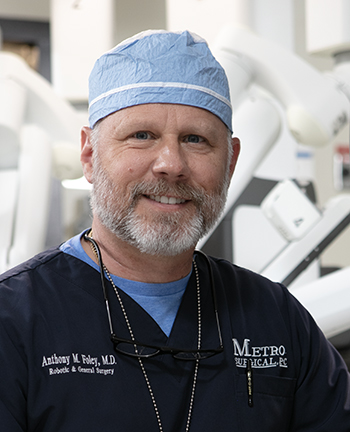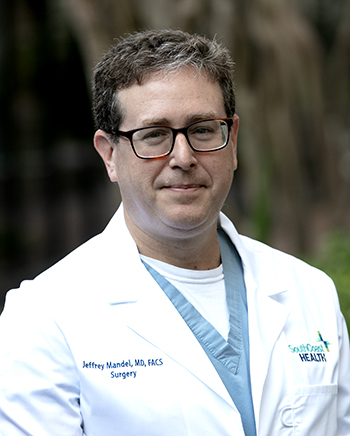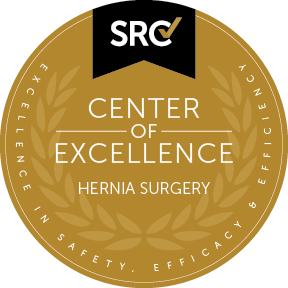Minimally-invasive treatment options for hernia repair means quicker recovery for patients
Miscellaneous
St. Joseph’s/Candler is a Hernia Center of Excellence in surgical care
Hernias are commonly diagnosed in the United States with more than 200,000 new incidents reported each year. So if you or a loved one develop a hernia, what do you do about it?
Well, what you can’t do is wait for it to go away. The reality of a hernia is it never goes away spontaneously when developed as an adult, says Dr. Anthony Foley, general surgeon and co-director of the St. Joseph’s/Candler Hernia Center of Excellence.
“Over time, they become larger. It could be relatively quick growth, or it could be a slow process,” Dr. Foley says. “As long as you’re active, as long as you are putting extra stress on the abdominal wall, that pressure just continues to make that hernia a bit larger over time.” 
There are different types of hernias. Most are caused by a combination of pressure at an opening or weakness of muscle or tissue.
“Basically, the pressure pushes an organ or tissue through an opening or weak spot,” explains Dr. Jeffrey Mandel, general surgeon and co-director of the St. Joseph’s/Candler Hernia Center of Excellence.
Related Article: Understanding types, causes and preventing hernias
Some hernias are painful while others are not. The most common thing people notice with a hernia is the bulge, both Dr. Foley and Dr. Mandel say.
“Whether or not that’s uncomfortable is hit or miss,” Dr. Foley says. “Some hernias can be terribly uncomfortable while other ones aren’t.”
“The reasons we fix them are: One, they tend to get bigger over time,” Dr. Mandel says. “And two, if the intestine goes through a weak spot, for example, then it can cut off the blood supply to that piece of intestine, and your intestine could potentially become gangrenous and rupture. If we catch it early, we can push it back in and the intestine can reperfuse without suffering any long-term damage.” 
Treating hernias
Determining the best course of treatment for hernia repair varies patient by patient. Certain hernias lend themselves to different types of approaches for repair, Dr. Foley says.
The ultimate way to repair a hernia is through surgery, and the two general ways to surgically fix a hernia is open vs. minimally-invasive. Minimally-invasive includes both laparoscopically and robotically with the da Vinci Surgical System.
“Minimally-invasive approaches tend to mean safer outcomes, less pain, a shorter hospital stay and quicker recovery times for our patients,” Dr. Foley says.
At St. Joseph’s/Candler, the majority of hernia surgeries are performed robotically on the da Vinci Surgical System. St. Joseph’s/Candler has offered minimally-invasive robotic surgery for more than 17 years.
“The robot has allowed an advanced way that surgery is done minimally-invasively for hernias that in the past were considered too large or too complex for laparoscopy,” Dr. Foley says.
Whether laparoscopically or robotically, small incisions are made to get access inside the abdomen, place the tissue or organ that is protruding through the hernia defect back into its proper location and then close the hole and reinforce it with mesh.
“It’s shown there’s lower recurrence rates if we close the defect and reinforce it with mesh than if you just close it alone,” Dr. Mandel says. “For example, inguinal hernia repairs without mesh reinforcement, there’s about 30 percent chance of recurrence. With mesh, it’s about one percent.”
So, if you or a loved one are living with a hernia, just know you don’t have to live with the discomfort that could be associated with it. Surgery has come a long way, creating a less invasive, quicker recovery process for you.
About the St. Joseph’s/Candler Hernia Center of Excellence

At St. Joseph’s/Candler, if you develop a hernia that requires surgery, you will get excellent surgical care, using the latest technology. St. Joseph’s/Candler is an accredited Hernia Center of Excellence by the Surgical Review Corporation (SRC).
What does this mean for you? This accreditation identifies St. Joseph’s/Candler, its hernia surgical locations and its highly-skilled physicians as healthcare providers who deliver excellence in patient safety and care.
“The Hernia Center of Excellence does two things. One, it’s a way to educate the public on the best way to treat their hernia, whether that is laparoscopically or robotically,” Dr. Mandel says. “The other thing the accreditation does is standardizes everything we do. We have standards for the surgeons and nurses to properly and safely care for patients.”
“I also hope this accreditation show folks in our part of the state, the Lowcountry of South Carolina and in rural southwest Georgia, that we have experts that can take care of this problem right in your backyard,” Dr. Foley adds. “You don’t have to go to a big city like Atlanta or Orlando. You should know that it’s not that far to come see us in order to be able to get what is considered world-class care.”
To learn more about the Hernia Center of Excellence accreditation or to request an appointment with one of our Surgeons of Excellence, visit our website.